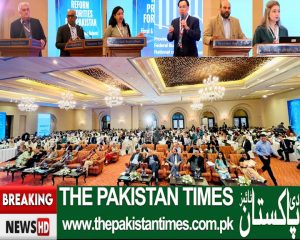
The joint initiative between the World Bank Group (Pakistan) and the Pakistan Institute of Economic Development (PIDE) has been successfully completed, bringing together a group of stakeholders committed to the economic development of Pakistan. This important meeting, organized to support the country’s new economic development program for the next five years, was marked by many discussions and a determination to share practical reforms. Dr. These measures were seen as a solution to the problem of Pakistan needing more foreign aid, as seen in the IMF report that more than $120 billion is needed in the next five years.
Dr. Haque reform plan covers key sectors including legal reforms, tax reforms, market liberalisation, energy efficiency, and agriculture and banking development. A key feature of the reforms was the introduction of the ‘Regulatory Guillotine, which aimed to eliminate burdensome regulations that inhibit business growth and innovation. These reforms aim to modernize Pakistan national economy, facilitate a business-friendly environment, improve export policies, improve import regulations and increase overall productivity.
The aim is to move Pakistan towards sustainable economic growth and development by encouraging investment, creating employment and increasing GDP growth. World Bank Regional Director (South Asia) Mathew Verghis, in his speech on “Reforms for a Better Future: Time to Decide”, said that Pakistan’s economy cannot survive as it is dependent on the budget and the increasing debt level with deficit financing in the current account. Up to 80% of GDP. He added that Pakistan’s expenditure exceeds its income and the country imports more than it exports, leading to increased domestic and external borrowing.
However, he stated that Pakistan has a bright future potential that is expected to achieve 7-8% annual gross domestic product by utilizing its youth, natural resources and lands, and emphasized that economic reforms should be given priority. . What is the situation today?
PIDE Joint Director Dr. Durre Nayab spoke on the subject of Public Administration in the 21st Century. Citing inefficiencies in Pakistan’s governance system, he called for sweeping reforms in various departments, including the cabinet, civil service, judiciary and local government. This demonstrates the need to reduce the size of the cabinet, reduce the size of the political structure and strengthen the skills and efficiency of the management role. The reforms aim to streamline and simplify public administration by eliminating outdated procedures, creating competitive hiring, digital operations and giving local governments more autonomy. Additionally, the debate calls for reforming ministries and private institutions to create transparency, transparency and efficiency in the delivery of public services, bringing them in line with modern governance standards and promoting effective and efficient methods of management.
Mr. Derek HC Chen, World Bank Economist, provides a comprehensive overview of Pakistan’s tax system with the aim of making the tax system more modern and efficient. The need for major reforms is discussed due to Pakistan’s low income by international standards and the complexity of the current tax system, which is characterized by arbitrary provisions and interest rates. The overview provides a detailed analysis of specific taxes, such as sales tax, income tax and corporate income tax, highlighting inefficiencies and tax expansion potential. The main proposals include rationalization, more taxes and better governance policies, and the use of funds from the provinces. This chapter highlights the vital role of systematic and progressive reforms to increase tax efficiency, support fiscal spending and promote economic equality.
Economic research expert Dr. Ahmad Waqar Qasim is highly critical of the current legal framework in Pakistan. He points out that this is a major impediment to economic activity due to the complexity and difficult nature of obtaining permits. It poses a burden that is seen as an ‘invisible tax’ that suppresses economic activity at all levels. This evaluation highlights the need for a “Regulatory Guillotine,” which has been successful in
different countries, to simplify regulation by eliminating unnecessary licenses and simplifying the process through the management system. It is argued that this approach is important in encouraging investment, making markets more efficient and reducing the bureaucratic appetite for over-regulation. The debate also calls for new regulations to be presented with a clear benefit analysis, and for a formal impact analysis (RIA) to be implemented to promote transparency and accountability in the regulatory process. In general, the document states that drastic measures should be taken to remove obstacles to economic growth and investment in Pakistan.
Ms. Maliha Haider, education expert at the World Bank, highlighted the significant progress made in Pakistan’s education system, including the expansion of free and compulsory education and the introduction of new reforms such as merit-based teacher recruitment and public-private partnerships. . Despite these efforts, Pakistan still faces significant challenges due to low education funding compared to South Asia, contributing to school dropout and learning poverty. Document , titled ‘Use better, spend more: How to calculate education expenditure for Pakistani children’, provides a comprehensive reform plan aimed at improving the efficiency of government spending on education to improve children’s learning outcomes. It emphasizes the need to increase incomes to 4.3% of GDP to increase efficiency, equity, governance, coordination and greater participation of parents and civil society. The proposed reforms aim to address the shortcomings of
and are underpinned by an evidence-based approach that will deliver lasting benefits and provide the basis for continuous improvement in the education sector.
As the discussion concluded, participants expressed confidence in the adoption and implementation of the proposed reforms and the positive impacts they are expected to have on the Pakistani economy.
Editor: Kamran Raja